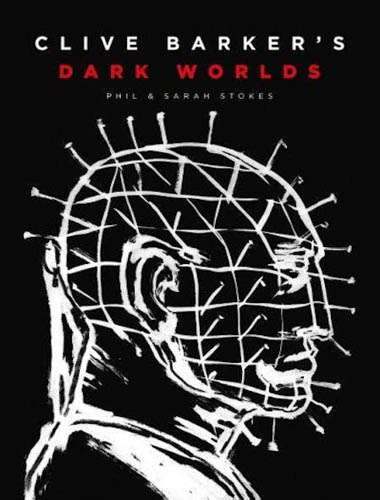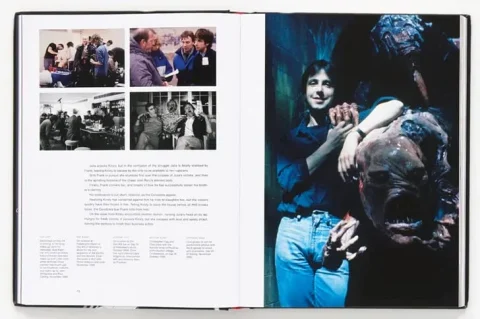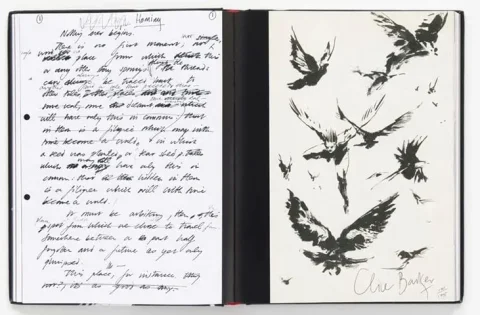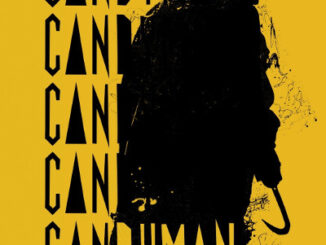AVAILABLE TO BUY: NOW
PUBLISHER: CERNUNNOS
HARDCOVER
352 PAGES

It begins, as it began for me also, with Hellraiser in 1986. Starting off this book with the thing that Clive Barker is most famous for was undoubtedly a good decision from writers Phil and Sarah Stokes. Hopefully it will help to draw in readers who aren’t as familiar with other work that he’s produced. As for my own introduction to Barker, I rented Hellraiser out of the video shop and was truly impressed by this genuinely dark chiller that seemed to exist in a different world to much of the genre fare that was currently coming out. Barker’s Books Of Blood, his six-volume [in their original incarnation] collection of short stories then really piqued my interest and I soon obtained the lot. I adored many things about these often grisly, frightening tales, but one thing that struck me in a very positive way was not so much how diverse they were, but how the way they were actually written seemed to vary; I wasn’t really aware back then of the fact that some artists begin working in different styles before they find the one that they’re most comfortable with, but even looking at the writing now does make one wonder how Barker could pen in such different ways. Then Nightbreed hit cinemas, but its release wasn’t very wide, and I ended up having to first see it on video. For a while it was one of my favourite films [this was a film where the monsters are the good guys!!!], and I’m still really fond of it even though its flaws became more apparent over time, with even Barker’s recent Director’s Cut having its issues though it’s clearly a better film. I never read Cabal, the book on which Nightbreed was based, until fairly recently, but I devoured Weaveworld and several that followed, the boundless imagination on display often making me feel that I really was in some kind of different dimension, not to mention Tapping The Vein, the graphic novel adaptations of many of the stories in the Books Of Blood. I’ll be honest and say that I didn’t read his later novels, and I don’t really know why. I sort of lost track of what he was up to and didn’t even hear about his serious illness until some time after it began.
Clive Barker’s Dark Worlds comes across as an impressively produced tome from the minute you pick it up. The 352-page book goes through Barker’s career, taking in everything he’s done – and he’s done a hell of a lot [I never knew he wrote poetry], so much so that a few things are perhaps given shorter shrift then some readers might have liked, but it was either that or we got a book that was even larger. There’s a lot to read, but none of it is heavy-going, and the fact that the 67 chapters are pretty short [occasionally only two pages long] makes it really easy to go through and then keep on going – in fact I couldn’t put the thing down on a few occasions. While each chapter covers a book, a film etc. from conception to reception, every now and again we get one about something else that’s important to Barker’s work, such as magic, which is one is his core subjects. The words of the authors are embellished by comments from Barker himself along with those of other writers and some critics so that we get an idea of the overall reception of each thing that Barker came up with. This in itself would be fine, but the aim was obviously to also produce a book that was extremely visual and give us a sense of what Barker has given to the world, so it has such sights to show you. It’s crammed with Barker’s sketches and paintings along with often rare behind the scenes photographs, pages of Barker’s handwritten notes, even flyers. This could have easily resulted in something which could seem like overkill, a not too easily digestable mess, but this is most definitely not the case. As well as it being obvious that the writers have done a lot of research, a lot of effort has also been made in making it as visually appealing as possible. The formatting is first class, and one looks forward to turning each page, wondering what your eyes will be greeted by next.

After the opening chapter on Hellraiser, this is curiously followed by 1984-85’s Books Of Blood and Barker’s 198 debut novel The Damnation Game before we flash back to Barker’s childhood. It’s an odd device – I wonder if the segue to the very early days should have taken place just after Hellraiser – though I guess beginning with the things with which Barker first made an impact upon the world does make a kind of sense. Perhaps unsurprisingly, Barker was a lonely child who felt that he didn’t fit in, but he got seriously into live theatre when he was still at school. Writing and producing plays, usually of a dark and strange nature, became his main activity for many years. In 1978 he co-founded the avant-garde troupe The Dog Company with former school friends and up and coming actors, many of which would go on to become key collaborators in Barker’s film work, most notably of course Doug Bradley, Pinhead himself. Because I knew virtually nothing about this lengthy portion of Barker’s career, I found all this fascinating. Phil and Sarah Stokes have unearthed an incredible array of stills both on and off stage and posters, as well as sketches and paintings because Barker found that method to be a better way of communicating ideas to his collaborators than using words, to compliment this delve into Barker’s theatre work. Experimental films Salome and The Forbidden led to the far more commercially minded but meddled with Underworld and Rawhead Rex – and then it was a little story entitled The Hellbound Heart which led to Hellraiser which truly propelled Barker into the big time, and eventually the non-Barker written and directed Candyman, based on his short story The Forbidden, and one of the greatest horror films of the ’90s.
One of the nicest things about Barker is that he doesn’t seem to resent being known more than anything else as the Hellraiser guy, despite the array of other material he’s given the world throughout his life. He happily talks about Pinhead, even if he’s not too keen on his name which was given to his most iconic character by others. His remarks, though none of them are new, are often enlightening, especially with regard to the themes which run through much of his literature, themes which may not be that apparent because of the denseness of the books. Loss, nostalgia, the passing of time – existential stuff which gives his work weight. The writing is good enough to make me interested in reading more of the books such as Galilee [his Romeo And Juliet], and Coldheart Canyon [a “Hollywood ghost story“], both of which seem to indicate that Barker doesn’t like repeating himself. And if only his erotic short story collection had been finished and published [well there’s still time]. The writers, who are Barker’s official archivists, seem to have found out everything that Barker has done, for example a list of his loves and hates for Esquire magazine in 1995, which actually reveals quite a bit about the man. There’d even a chapter on attending signings and conventions. However in January 2012, Barker suffered toxic shock, three heart attacks and was in a coma for eleven days. He was told that he probably wouldn’t live, but what’s sadder is when he talks of friends who backstabbed him and spread lies. In any case, he’s still alive now and still involved in various projects even though he hasn’t written a novel in some time.

The book finishes with a heartfelt Afterward from Barker, though, despite certain things such as the afore-mentioned list in Esquire, I didn’t feel I knew Barker much more the I had before by the time I closed it for the final time. However, this was never intended to be a biography, so I guess that’s more a case of me expecting a different book from the I got. Likewise there’s no critiquing of Barker’s output; it’s all appreciation. I love to know the opinions of the authors on whether they think, for example, that Candyman is better than Hellraiser, or what the best stories out of the Books of Blood are. Or indeed if there are any flaws in Barker’s writing. However, they’re clearly really deep into their subject, so maybe we’ll get that someday. In the meantime, both casual fans and hardcore devotees should thoroughly enjoy Clive Barker’s Dark Worlds, which stands as a fine tribute to someone who’s not just one of the most visionary writers of our time but one of the most visionary artists of our time, full stop.
Rating: 














Be the first to comment